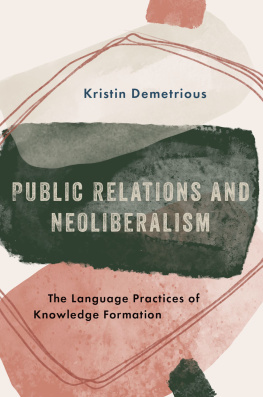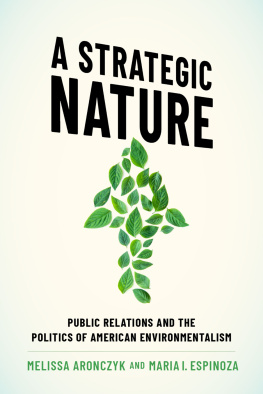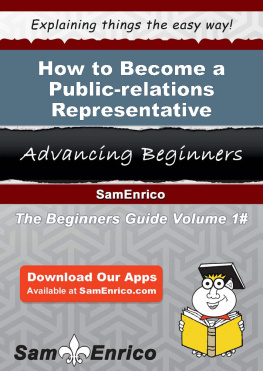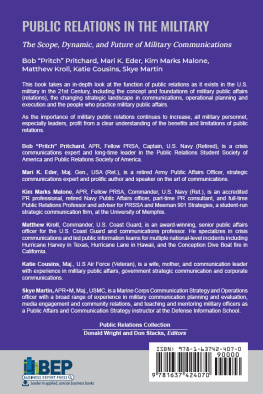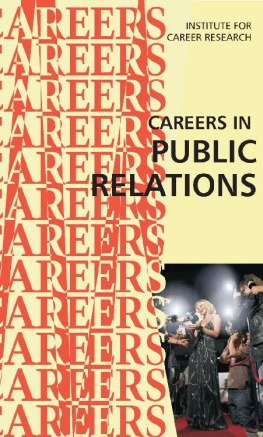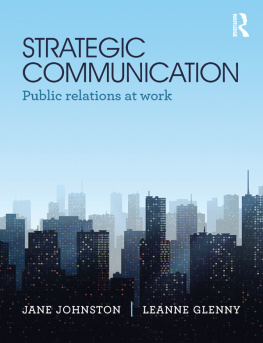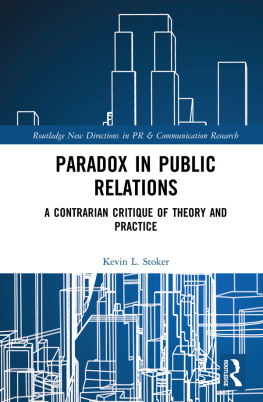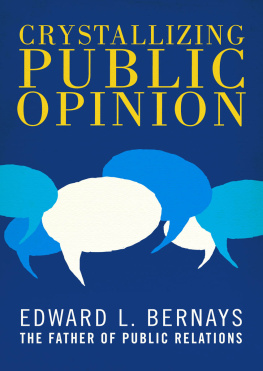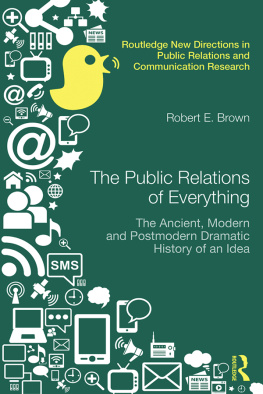Public Relations and Neoliberalism

Oxford University Press is a department of the University of Oxford. It furthers the Universitys objective of excellence in research, scholarship, and education by publishing worldwide. Oxford is a registered trade mark of Oxford University Press in the UK and certain other countries.
Published in the United States of America by Oxford University Press
198 Madison Avenue, New York, NY 10016, United States of America.
Oxford University Press 2022
All rights reserved. No part of this publication may be reproduced, stored in a retrieval system, or transmitted, in any form or by any means, without the prior permission in writing of Oxford University Press, or as expressly permitted by law, by license, or under terms agreed with the appropriate reproduction rights organization. Inquiries concerning reproduction outside the scope of the above should be sent to the Rights Department, Oxford University Press, at the address above.
You must not circulate this work in any other form and you must impose this same condition on any acquirer.
Library of Congress Cataloging-in-Publication Data
Names: Demetrious, Kristin, author.
Title: Public relations and neoliberalism : the language practices of
knowledge formation / Kristin Demetrious.
Description: New York : Oxford University Press, 2022. |
Includes bibliographical references and index.
Identifiers: LCCN 2022021191 (print) | LCCN 2022021192 (ebook) |
ISBN 9780190678395 (hardback) | ISBN 9780190678401 (paperback) |
ISBN 9780190678425 (epub)
Subjects: LCSH: Public relations. | Neoliberalism. | Persuasion (Rhetoric) |
Communication in politics. | Environmentalism. | Mont Plerin
SocietyHistory. | Free enterpriseSocieties, etc.History. |
LiberalismSocieties, etc.History.
Classification: LCC HM1221.R44 D46 2022 (print) | LCC HM1221.R44 (ebook) |
DDC 659.2dc23/eng/20220707
LC record available at https://lccn.loc.gov/2022021191
LC ebook record available at https://lccn.loc.gov/2022021192
DOI: 10.1093/oso/9780190678395.001.0001
Contents
There are many people that help to bring about a book. In this, I am grateful to colleagues at Deakin University for the valuable support that was offered in many different ways: in particular to Geoff Boucher, Janine Little, Lisa Waller, and Andrew Singleton. Lending her expertise in climate change, Alexis Demetrious reviewed the chapter dealing with this, which was much appreciated. I would like to acknowledge Christine Daymon, a friend and colleague who has long been a source of stamina and courage. I am also grateful to Linda Hon at the University of Florida for her interest in my research and her commitment to reform in the field. In nurturing the ideas that are explored in this book, my PhD supervisor and colleague at Deakin University over the early 2000s, Dr Patrick Hughes, was especially significant. Patrick and I shared a view that the production of theory in public relations served to valorise the field and divert attention from its real-world impacts, and its critics. Moreover, that there was a great deal more to say about PRs relationship to society, language and the construction of knowledge. In preparing the manuscript for publication, my editor Meredith Keffer from OUP provided valuable advice, and I thank her for that. Thanks, too, go to the anonymous reviewers for their helpful comments and engagement with the ideas. For personal support, deep appreciation is offered to my family and friends. I thank Jim, Jannes, Alexis and Eugene, Georgia, Viv and Jim, and my siblings, as well as Dorinda Talbot and Caroline Madin who kept me going over what turned out to be a longer journey than anticipated.
Today, voices raising the ideas of renewal, or an ambivalent social critique in public debate, may become objects caught up in conflict and language games, and fail to make any mark at all. And sometimes there are no voices to be heard; perhaps because there are no words to say. Public debate determines politics, and all too often, politics fails. Public relations has a hand in making this reality. Organized around an all-encompassing, market-based view of the world, a public relations campaign or plan is designed to enclose or eliminate debate. Implementing it may spotlight an array of public fears, problems, and concerns, and develop a tightly controlled message in response, releasing it at strategic points of public debate so that it can control any opposition coming from groups or individuals. From the outset, the intent is to reduce or deactivate resisting ideas, and to lock in thinking and set expectations. In negotiating this approach, public relations conceives of communication as a programmatic, instrumental, and ethically neutral process.
In this practice, public language, or the language of political participation, may be emptied of meaning and brutalized, while at the same time being towed into a powerful slipstream of market-based ideas. With sensibilities dulled by the persistent and pervasive messaging in public debate, or crumpling from its barbs and poisonous stings, the public starts to turn away, and in one way or another accepts this reality as inevitable. And within online conditions there are many other patterns and effects, which we are only just beginning to understand. For Graeme Turner, the digital conditions that promised so much, and that produced communication giants like Amazon, Facebook, and Google, instead have fallen short:
Ironically, the much vaunted capacity of the digital world to enable us all to share more effortlessly than ever before has turned out instead to multiply the number of tribalised points of concentration. Furthermore, in relation to the nature and conditions of contemporary democracies, and as the tech giants establish their oligopolies in large part through the marketing of hate, anger, and misinformation as forms of entertainment, there are serious concerns about the future of a democracy that depends upon the existence of an informed and engaged public.
These cultural conditions not only determine what or whose voices are heard, but also form an iron grip on the public imagination, deafening them to the cries of those marginalized individuals and groups entrapped by circumstance and subject to fear, vulnerability, and hardship, or to the science that is critical to the planets survival. This book is about public relations. But it is also about how we have learned to think, to speak, and to live using the language of public relations, as its practices and ideas are absorbed, and have become inseparable to, contemporary conditions. In this uncoupling, I show how the relationships that joined money, power, and an ideological agenda to the public relations industry impelled a partnership that led to its wider propagation and proliferation in society.
The idea of this book was seeded in my investigations of the public relations industry, and its disproportionate, but sometimes unrecognizable, discursive power and political practices in contemporary society, and their effects and implications. These investigations are seen through a prism that business, government, and any others subscribing to simple Therefore, despite some pockets of criticality and difference within the field of public relations, its concepts and categories cohere around the magnet of market-based society and work to enclose ideas around these themes.

